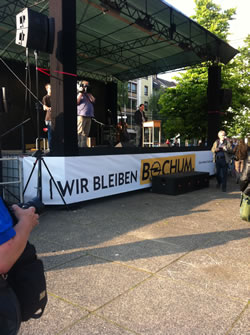 Article by Wolfgang Schaumberg, English version and summary of „Opel-Krise und Gegenwehr“ 8. August 2012
Article by Wolfgang Schaumberg, English version and summary of „Opel-Krise und Gegenwehr“ 8. August 2012
“Since 2001, GM — active throughout Europe under the brand-name “Opel” — has reduced its number of employees in Europe to 40,000. That’s 8,000 less than in the year 2008. GM now has 55,000 employees in China. After two factories were already closed in Portugal and Belgium, GM announced last year that it would end production in one of its four German factories, in Bochum, at the end of 2014 and sell the production area, which is as large as about 200 soccer fields. For decades, Opel Bochum was GM’s largest production facility, and in 1992 still had 19,200 employees. Step by step, the labor force was reduced to 3,500, but always in the face of tough resistance struggles like in no other facility. Even internationally, the labor force at Opel attracted attention through its independent so-called “wildcat strike” in the year 2000 (3 days) and in particular in 2004 (6 days)…”
weiterlesen »
 Article by Wolfgang Schaumberg, English version and summary of "Opel-Krise und Gegenwehr" 8. August 2012
Article by Wolfgang Schaumberg, English version and summary of "Opel-Krise und Gegenwehr" 8. August 2012
Since 2001, GM -- active throughout Europe under the brand-name “Opel” -- has reduced its number of employees
weiterlesen »